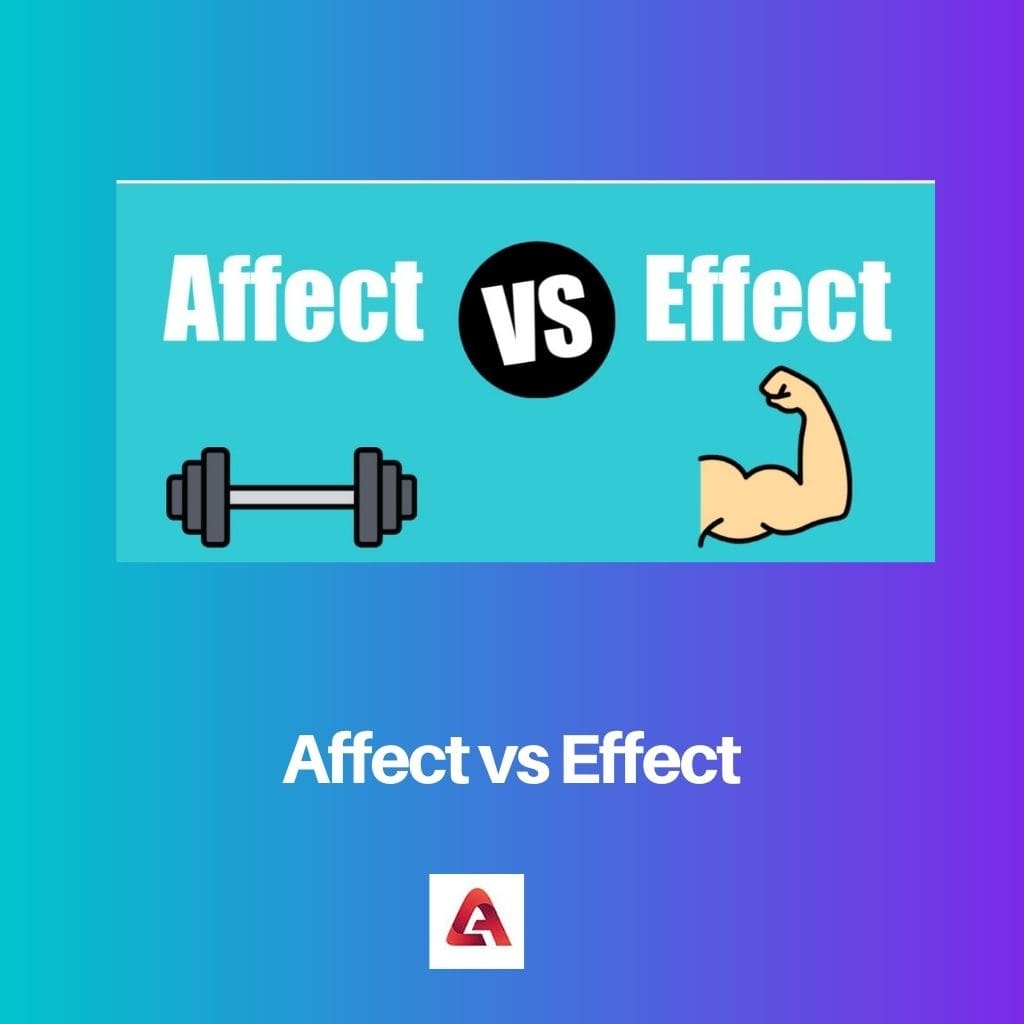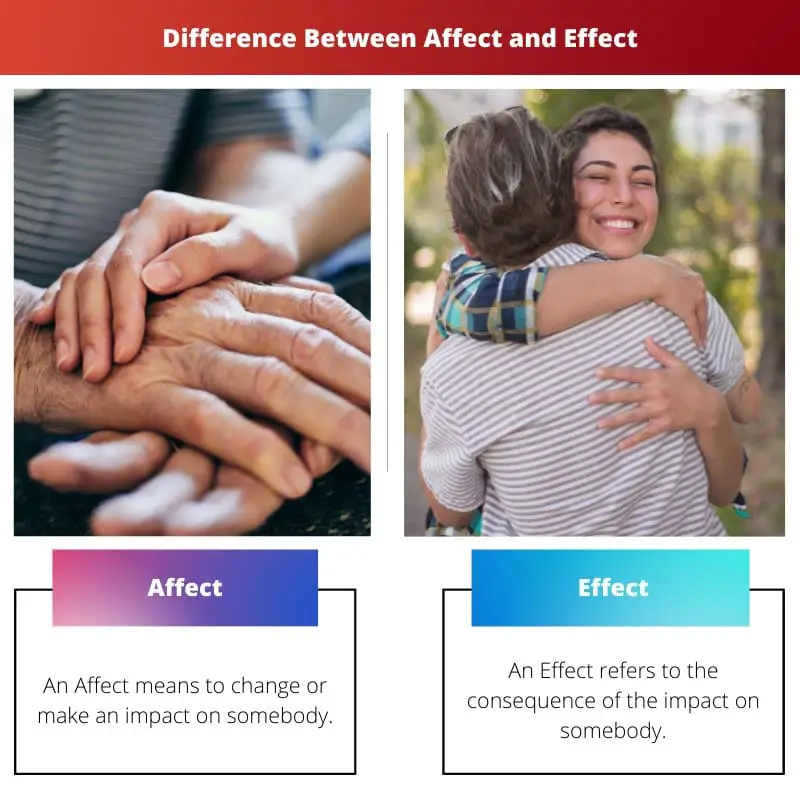“Affect” is typically used as a verb, indicating influence or change, such as “The weather affects my mood.” On the other hand, “effect” is usually a noun denoting the result or consequence of an action, like “The medication had a positive effect on his health.” Remembering this distinction can prevent confusion in writing.
Key Takeaways
- Affect is a verb that means to influence or produce a change in something.
- Effect is a noun that refers to the result of a particular action or event.
- Affect is the action, while the effect is the result.
Affect vs Effect
The difference between Affect vs Effect is that Affect is pronounced with more laziness, i.e. it has an “uh-ffect” while Effect is a bit stronger with an “uh” effect. In primary English, the term Affect is a verb, while the word Effect is a noun. Affect is a verb and implies to change or impact something. An Effect is a noun, and it is a result of a change.

Affect and Effect mix up well; thus, people need to know the general phrases and situations where the rules for these words change. Now I hope you all will be able to answer the following question quickly;
Is it Affect or Effect? Since you all learned the fundamental difference between Affect and Effect, now it is time for you to learn the implications and usage of both terms.
Comparison Table
| Feature | Affect | Effect |
|---|---|---|
| Part of speech | Verb | Noun |
| Meaning | To influence or change something | The result or consequence of something |
| Sentence position | Often used with an object that is being affected | Often used with a preposition like “on” or “of” |
| Examples | * The new policy will affect employee morale. * Learning a new language can affect your brain. | * The storm had a devastating effect on the coastal towns. * The medicine had little effect on his symptoms. |
What is Affect?
Affect refers to the outward expression of emotions, moods, and feelings displayed through verbal and non-verbal cues. It encompasses facial expressions, gestures, tone of voice, and other behaviors that convey one’s emotional state. Affect plays a crucial role in interpersonal communication, influencing how individuals perceive and interpret interactions with others.
Types of Affect
- Positive Affect: Positive affect encompasses emotions such as happiness, joy, excitement, and contentment. Individuals with a predominance of positive affect tend to experience life with enthusiasm and optimism, leading to greater resilience and overall well-being.
- Negative Affect: Negative affect includes emotions like sadness, anger, fear, and disgust. Those experiencing negative affect may exhibit behaviors such as withdrawal, irritability, or aggression. Persistent negative affect can contribute to mental health issues such as anxiety and depression.
- Neutral Affect: Neutral affect refers to a lack of strong emotional expression or an absence of identifiable emotions. It may manifest as a calm demeanor or a state of emotional neutrality, often observed in situations requiring objective decision-making or professional conduct.

What is Effect?
Effect refers to the result, outcome, or consequence of an action, event, or process. It denotes the tangible or observable change that occurs as a direct or indirect result of something else happening. Understanding the concept of effect is crucial in various contexts, including causality, problem-solving, and decision-making.
Types of Effects
- Direct Effect: A direct effect occurs when the outcome is immediately produced by a specific cause without any intervening factors. For example, turning on a light switch directly results in the illumination of the room.
- Indirect Effect: Indirect effects are those that occur through intermediate steps or influences. These effects may be more complex and involve multiple causal factors. For instance, implementing a new policy in an organization may have indirect effects on employee morale, productivity, and overall company culture.
- Intended Effect: The intended effect is the desired or anticipated outcome of a particular action or intervention. It reflects the purpose or goal behind the action. For instance, the intended effect of implementing a marketing campaign might be to increase brand awareness and customer engagement.
- Unintended Effect: Unintended effects are outcomes that occur unexpectedly or unintentionally as a result of an action or decision. These effects may be positive, negative, or neutral and can have significant implications. For example, a new environmental regulation aimed at reducing air pollution might unintentionally lead to job losses in certain industries.

Main Differences Between Affect and Effect
- Usage as Parts of Speech:
- “Affect” is primarily used as a verb, indicating influence, change, or emotional response, such as “The weather affects my mood.”
- “Effect” is predominantly used as a noun, representing the result, outcome, or consequence of an action or event, like “The medication had a positive effect on his health.”
- Function in Sentences:
- “Affect” typically denotes the action of influencing or producing a change in something else.
- “Effect” refers to the result or outcome that is produced by an action or event.
- Examples:
- “The loud noise affected my concentration, making it difficult to focus on my work.”
- “The construction project had a significant effect on traffic flow in the area.”
- Remembering the Distinction:
- One way to remember the difference is through the mnemonic “RAVEN”:
- R for Remember: “Affect” is a Verb, and “Effect” is a Noun.
- A for Action: “Affect” is about Action (Influence or Change).
- V for Verb: “Affect” is primarily a Verb.
- E for End: “Effect” is what you End up with (Result or Outcome).
- N for Noun: “Effect” is predominantly a Noun.
- One way to remember the difference is through the mnemonic “RAVEN”:


This article offers a clear and insightful explanation, which is quite beneficial for anyone striving to improve their writing skills.
Absolutely, the clarity and precision of the explanations are truly commendable.
This article offers a valuable analysis, making it easier to understand the distinction between affect and effect.
Agreed, the examples provided effectively illustrate the point.
Learning about grammatical nuances such as the difference between affect and effect can indeed be intriguing.
Absolutely, understanding these nuances adds depth to language comprehension.
The clear explanations and examples in this article are indeed beneficial for language learners and writers alike.
Yes, the article is incredibly useful and well laid out.
I am glad to see this explained clearly and concisely. It is a common mistake, so this is very helpful for all types of writing!
You are completely right about that. Thank you for pointing that out.
I agree it’s very helpful!
I believe this article effectively illustrates the confusion that people experience between affect and effect.
Yes, it indeed clarifies the distinction in a comprehensive manner.
Informative article. Keep it up.
Approaching grammar rules in a clear and methodical manner is something we all need. Thanks for providing this detailed breakdown!
Indeed, clarity and thoroughness are essential for understanding and learning.
Absolutely! This article is very helpful for honing writing skills.
The detailed analysis and comprehensive examples in this article are truly beneficial in understanding this confusing area of grammar.
I completely agree. This article is a valuable resource.
I couldn’t have said it better. It’s an excellent read.
This article provides an impressive elucidation of the difference between affect and effect, which is highly commendable.
Well said. This resource serves as an invaluable guide.
Absolutely, the comprehensive nature of the explanation is noteworthy.